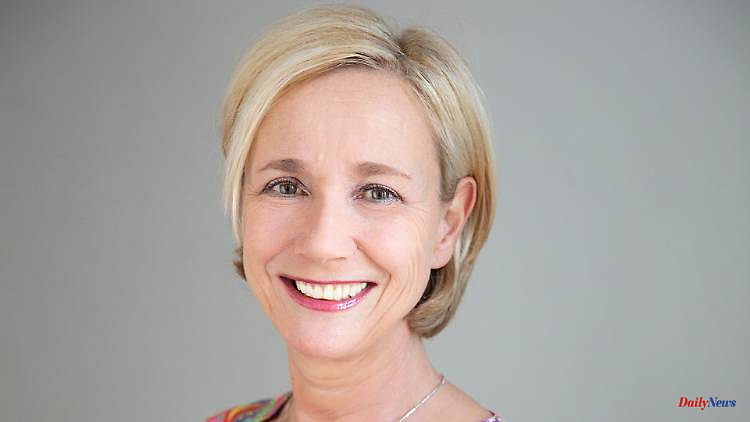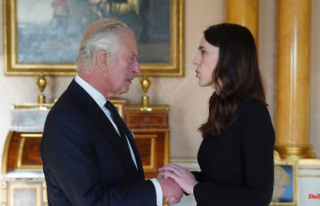Her third dream woman volume, now with "spare parts": This time, the Munich author Amelie Fried lets her protagonist go through the hell of her 60th birthday. It's about adult children, illnesses, unwelcome daughters-in-law, friendships that have grown older and the illusions that women over 60 are still allowed to indulge in. Or rather not. Because if your own husband is more interested in a bike ride than in a blowjob - does he have a young lover? Or is he just old? And is there still some kind of suspense to be built up in the relationship between Amelie Fried's dream woman Cora and her artist? ntv.de asks the bestselling author.
ntv.de: The "dream woman" is now a trilogy - what does "dream woman" mean to you?
Amelie Fried: I used the term with a wink from the start and meant it rather ironically. The first Traumfrau volume was written at a time when so-called "cheeky women's novels" were booming, so I never really felt like I belonged there. In my opinion, there is no such thing as "dream women".
Why not?
A dream woman is what someone else sees in her. If you are in love with a woman, then maybe that corresponds to the dream ideas that you have built up over time. It's a cliché term that I meant rather mockingly.
The book is written in the first person, so I read it with you in mind. Up to the point...
… when it becomes clear that Cora has long black hair and a big nose, I really can't offer that (laughs). But this dream woman has a living role model, a friend of mine who has been friends with me for over 30 years. Over the years, however, the dream woman in my book has adapted a bit to me. I gave her some of my traits because it's easier to relate to a character when there's something about them too. A lot of what she thinks and says I wouldn't think and say that way. On the other hand, my character has a kind of humor and self-mockery that I sometimes wish I had too.
For example, you always want to be quick-witted.
Yes, but I thought a lot about the quick-witted dialogues in the book (laughs). Most great answers come to you later. But that's the beauty of a character like that - you can invent it, breathe life into it and then live things out that you wouldn't even dare to do yourself. Cora is a courageous and combative person - I think that's good.
Growing old with your book protagonist, what is it like?
It's like going back to an old friend I haven't seen in a while. I'm very curious about what happened to her in the meantime. It's exciting to think about how a character went on while writing. Cora used to have a dating agency, but now she has completed therapy training and runs couples counseling. Isn't it logical to first bring couples together and then to help solve the problems that they wouldn't have without each other. (laughs).
And saying goodbye to the character, is that hard at the end of the book?
I'm very lucky there, all Traumfrauen volumes sell extremely well, so far I've always been able to return to my character.
The book covers almost all topics that are important for women. From cancer screening to diagnosis, sex and no sex, family, friendship drifting apart...
Yes, but I saved a few topics... (laughs)
That means she's 60 now, will we see her again on her 70th?
I don't know yet (laughs). "Dream woman with support stockings" maybe, or with a walker? With "Dream Woman" I always deal with the topics that play a role in the respective phase of life. It started when I was 30, pregnancy and prenatal diagnostics, becoming parents played a role, when I was 40 I hadn't yet had the idea of making a series out of it, but then I did when I was 50, and then it was all about the fading eroticism, affairs, that rebellion against old age. And now 60. It only makes sense if you ask yourself the appropriate questions.
Is that a bad date, the 60th birthday?
It's definitely a drastic date, we have these images in the mind of 60-year-olds: beige windbreakers, health shoes - we don't want that under any circumstances (laughs). How you start or suppress the day is probably very individual: In bed with a bottle of sparkling wine and a Netflix subscription or a big party with dancing until you pass out. I celebrated my 60th, smaller circle, but with dancing until the morning. I was so happy! And besides - what is the alternative? Dying young - I missed that.
How do you keep your dignity?
It has a lot to do with attitude, both internal and external. So a straight back also immediately tightens the whole charisma. I always make sure I walk upright. You also have to look outward and straight ahead, and not just at yourself and your own frivolities. Also: concentrate on what is possible and not on what is no longer possible! I won't be a figure skater or chancellor anymore, that's for sure, but as long as my bones allow, I could still jump out of a plane with a parachute.
Would that be your wish?
Not necessarily, I just mean that it's time to tackle your dreams!
I keep hearing that people in their 80s still think they're only - at most - 50. Not on the outside and the niggles are getting worse, but the attitude, the basic structure, remains.
My dream woman Cora also sees it this way: that there is a big difference between how others perceive you and how you perceive yourself. How you feel and how you see yourself perceived and reflected by your surroundings. And I feel that too: you have a certain personality, you go through a maturing process, and yet you remain who you are. That also means that when I'm in a group with younger people, I like to say "we" - and they then give me an irritated look. Because the young see me as a much older woman, for them it's not a "we" feeling. It used to be the same for me: a 64-year-old like me came from another planet. It's a bit painful, I'll admit.
On the other hand, one has to realize that "young" does not necessarily mean "great". There are people who are born boring and stay that way.
That's correct. Just because the skin is still smooth doesn't mean that everything is fine. Sometimes I even think it's really not easy for the boys. For example, I ask myself how young people can still find the confidence to have children in these critical times. Professionally, too, many have a harder time than we did back then. My feeling, my view of youth, is rather concerned and completely free from envy. I really enjoy talking to young people, you learn a lot that way. There is a lot of power, a lot of intelligence and a great willingness to accept challenges.
Ok, there are limitations, at some point you stop having children and you usually won't take up a new job, but there's still something to come, there are still a lot of positive surprises and experiences, I think.
"My life can still surprise me" - that's a key sentence. This is an attitude towards old age that we need. If at some point I say, well, I already had everything, I don't need it anymore, what else is to come, then I don't know either. I really don't want to have anything to do with people like that, it's boring. At least I don't want to grow old like that!
Also a topic in the book: partnership and sex - Cora would like to "get down to business" with her husband for his 60th birthday, but he prefers a bike ride on a mountain bike to a blowjob...
I think we really need to rethink our attitude towards old age. Humans are designed by nature to reproduce, that's possible. at least in women. After a certain age, they no longer have sex, so to a certain extent they are also denied the right to have sex. Of course, over 60-year-olds have sex …
... and if they don't have one, they would like to have one.
Definitely a lot! Since men can father children into old age, they are more likely to be credited with still having a sex life. Couples should definitely talk openly about what they want, I think there is more to it than many people think. But the good thing about old age is that you no longer have to put yourself under pressure and can develop a composure that you don't have when you're younger.
In the course of time you also grow apart from people you have known for a long time...
Some friendships last, some end without anything happening, but it just doesn't fit anymore. Then you have to let go, let go. It is now easier for me to let people go, on the other hand I have also made new friends. And what I strongly advise: Find younger friends! I see that with my mother, who is over 90 years old: most of her friends of the same age have long since died. The younger ones, however, visit her now and see her as a conversation partner with whom one likes to be together. If you don't want to get lonely in old age, then you have to make a little effort to stay interesting.
Sabine Oelmann spoke to Amelie Fried












